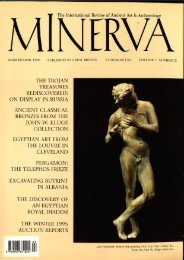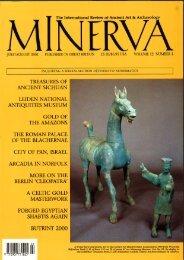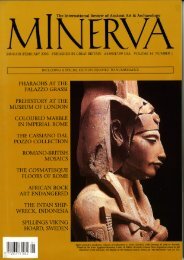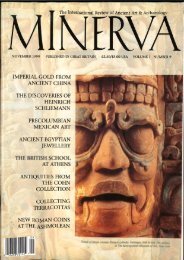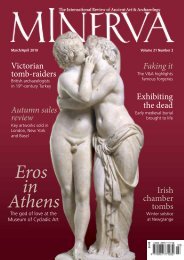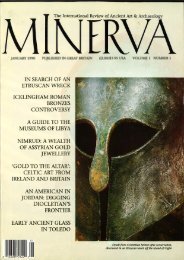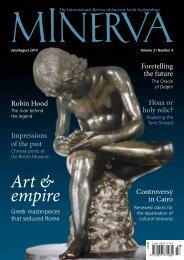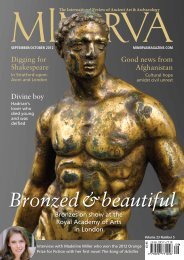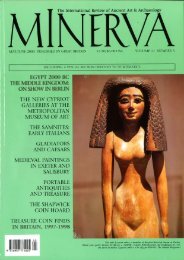Alexander in Amsterdam - Minerva
Alexander in Amsterdam - Minerva
Alexander in Amsterdam - Minerva
Create successful ePaper yourself
Turn your PDF publications into a flip-book with our unique Google optimized e-Paper software.
Fig 4. The Forum <strong>in</strong> Rome. It is <strong>in</strong> the shadow of the Temple of Saturn, of which eight columns still<br />
survive, that Falco first made his appearance <strong>in</strong> The Silver Pigs (1989). Photo: Oliver Mallich.<br />
always said, certa<strong>in</strong>ly among the lower and<br />
middle classes. I always remember that modern<br />
Italian women – who are certa<strong>in</strong>ly no pushover<br />
– are the descendants of the women of ancient<br />
Rome, so it’s not difficult for me to believe that<br />
they could be fairly outspoken!’<br />
It is a challenge for any historical novelist to<br />
imag<strong>in</strong>e the thought processes of people from<br />
ancient civilisations. The picture L<strong>in</strong>dsey pa<strong>in</strong>ts<br />
of Rome <strong>in</strong> the late 1 st century AD is one filled<br />
with people driven by the same desires and<br />
motivations as today’s men and women, and she<br />
does <strong>in</strong>deed view Roman society as be<strong>in</strong>g very<br />
much like ours.<br />
‘I was a civil servant so I like writ<strong>in</strong>g about<br />
Roman bureaucracy. We don’t actually know<br />
that much about how it worked, but I imag<strong>in</strong>e<br />
it operated rather like ours. I like politics,<br />
I am <strong>in</strong>terested <strong>in</strong> capitalism, the sense of how<br />
some people have power because they have huge<br />
amounts of money. That is go<strong>in</strong>g to be relevant<br />
when you are writ<strong>in</strong>g about crimes – whether<br />
ancient or modern – where money is a motive.<br />
‘There is a lot of me <strong>in</strong> Falco, as he is speak<strong>in</strong>g<br />
<strong>in</strong> the first person, it is difficult not to write it as<br />
if he were myself. I also see myself <strong>in</strong> Helena. I<br />
th<strong>in</strong>k Falco is becom<strong>in</strong>g <strong>in</strong>creas<strong>in</strong>gly conscious<br />
of what it is to be a Roman as he becomes a family<br />
man over the series.<br />
‘I start from the po<strong>in</strong>t of view that human<br />
nature doesn’t change, but at the same time I<br />
wanted to show the way <strong>in</strong> which the Roman<br />
world is similar to ours, as well as the ways <strong>in</strong><br />
which it differs. I do cover issues like slavery and<br />
gladiators, which are obviously very uncomfortable<br />
topics for us, but which were part of life <strong>in</strong><br />
first century Rome, so I try to portray them as<br />
th<strong>in</strong>gs my characters accept.<br />
‘When I was writ<strong>in</strong>g a book about gladiators, I<br />
saw a documentary completely unrelated to the<br />
ancient world, about young boxers <strong>in</strong> the East<br />
End of London, and I saw a strong l<strong>in</strong>k there <strong>in</strong><br />
that it was a way a poor young man could make<br />
his fortune, and become famous. While most<br />
gladiators would die <strong>in</strong> the amphitheatre, for<br />
somebody who had noth<strong>in</strong>g, it was an occupation<br />
that held out the k<strong>in</strong>d of hope that be<strong>in</strong>g a<br />
good boxer might offer today.’ (Fig 6.)<br />
Did L<strong>in</strong>dsey know from the beg<strong>in</strong>n<strong>in</strong>g that<br />
the idea of detective novels set <strong>in</strong> Imperial Rome<br />
would prove to be so popular? ‘I had no qualms<br />
about the readership, but my publishers were<br />
anxious because apart from books like Robert<br />
Graves’ I, Claudius, which had been written <strong>in</strong><br />
the 1930s, there was virtually no popular fiction<br />
set <strong>in</strong> the Roman period. The idea of a modern<br />
novel about a Roman detective was terrify<strong>in</strong>g to<br />
publishers, we had great trouble sell<strong>in</strong>g the idea.<br />
My agent eventually found an editor who wasn’t<br />
fazed by the idea of cross<strong>in</strong>g the genres of historical<br />
fiction and detective stories, and he has<br />
edited every book I have ever done.’<br />
L<strong>in</strong>dsey acknowledges that historical fiction<br />
is often dismissed by critics. ‘I’d like my books<br />
to be seen as good novels, not just genre novels.<br />
If you are a historical novelist that is where<br />
you lose out, because you are judged by different<br />
standards – quite wrongly so, as they have<br />
to be really good page-turners, and you have to<br />
get the history right, or people write you angry<br />
letters! I have created all sorts<br />
of plot l<strong>in</strong>es <strong>in</strong> the Falco series<br />
– I have deliberately not made<br />
any of them the same. I th<strong>in</strong>k<br />
what has made the series so<br />
successful is that readers never<br />
quite know what they’re go<strong>in</strong>g<br />
to get; I always try to spr<strong>in</strong>g a<br />
few surprises on them. I’ve featured<br />
police procedurals <strong>in</strong> the<br />
ancient world; I’ve done Agatha<br />
Christie-style stories that start<br />
with a body <strong>in</strong> the library and<br />
end with all the suspects gathered<br />
<strong>in</strong> the same library; I’ve<br />
focused on adventures set <strong>in</strong> the<br />
wild woods, and it all seems to<br />
work.’<br />
Famously, L<strong>in</strong>dsey wrote The<br />
Silver Pigs (1989) without hav<strong>in</strong>g<br />
Fig 5. The Triumph of Titus, AD 71, by<br />
Lawrence Alma-Tadema, Oil on panel, 1885.<br />
The emperor Vespasian leads the imperial<br />
family <strong>in</strong> procession. Titus follows beh<strong>in</strong>d<br />
with his daughter Julia, while Domitian comes<br />
next. In the background, the menorah, taken<br />
from the Temple <strong>in</strong> Jerusalem, emphasises<br />
Titus’s suppression of the Jewish revolt. Image<br />
courtesy of the Walters Art Gallery, Baltimore.<br />
ever visited Rome. In fact, she still has not visited<br />
all the ancient sites she describes so vividly.<br />
‘And I defy anybody to tell which ones I have<br />
actually been to and which ones I’ve read about<br />
<strong>in</strong> books! I have to be very careful when writ<strong>in</strong>g<br />
about Rome, as so many build<strong>in</strong>gs and monuments<br />
were actually built later than the late first<br />
century, the period I deal with. One aspect of<br />
ancient Rome that I did misjudge was the scale<br />
of the place. In The Silver Pigs <strong>in</strong> particular,<br />
Falco is very mobile <strong>in</strong> the city and although he<br />
is tough, he could not have physically achieved<br />
all that I had him do<strong>in</strong>g <strong>in</strong> a day, so I had to do<br />
some re-writ<strong>in</strong>g to make the story possible.<br />
‘Falco hasn’t really done Gaul yet; he has only<br />
passed through. He has made some disparag<strong>in</strong>g<br />
comments about Marseilles<br />
(ancient Massalia) but I’m<br />
not go<strong>in</strong>g to set a story <strong>in</strong> the<br />
prov<strong>in</strong>ce until I want to take<br />
an easy holiday <strong>in</strong> France!<br />
Falco has also not yet been to<br />
the outer reaches of Hungary,<br />
and while Alexandria (2009)<br />
ma<strong>in</strong>ly took place <strong>in</strong> the<br />
Egyptian city, and Two for the<br />
Lions (1998) was partly set <strong>in</strong><br />
Tripolitania <strong>in</strong> what is today<br />
Libya (Fig 7), I’ve not set any<br />
of the other novels elsewhere<br />
Fig 6. Grave stele of a<br />
gladiator named Seilonis,<br />
who fought at Ephesus dur<strong>in</strong>g<br />
the Roman period. Museum<br />
of Ephesus, Turkey. Photo: Ian<br />
W. Scott.<br />
M<strong>in</strong>erva September/October 2010 45



